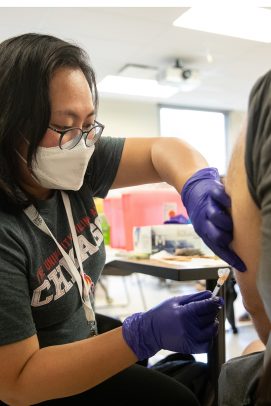Monkeypox: Q&A with Dr. Susan Bleasdale
Dr. Susan Bleasdale is the chief quality officer for the University of Illinois Hospital & Health Sciences System and assistant vice chancellor for quality and patient safety for UIC. She is an infectious disease expert who specializes in how infections — including COVID-19, Ebola, influenza, MERS, tuberculosis, HIV and others — are spread and how they can be prevented within and outside the hospital.
What is monkeypox?
Monkeypox refers to the disease caused by infection with the monkeypox virus. Since the first human case was identified in 1970, almost all cases were concentrated in people who lived in or traveled to western or central African countries or who had contact with imported animals (small mammals).
Recently, cases of monkeypox have been identified in numerous countries, such as the United States, where it is not commonly found. As of Aug. 25, the City of Chicago has reported 800 cases of monkeypox. UI Health has managed 15 patients as of this date.
How does it spread?
Monkeypox occurs through skin-to-skin contact with an infected person’s body fluids (e.g., fluid from skin sores that occur with this infection). Sexual contact is currently the main way people have acquired the infection.
People can also get infected through very close, prolonged face-to-face contact with an infected person through respiratory secretions. Transmission of the virus can also occur when people touch or share household items such as bedding, towels or clothing with an infected person.
Is there a risk of monkeypox in the classroom?
Monkeypox is spread by prolonged intimate close contact. Classroom activity is not considered a risk for transmission of monkeypox. In addition, masks are still required in the classroom, which provides additional protection.
What are the symptoms of monkeypox, and how long does it last?
A person infected with the monkeypox virus will usually begin having symptoms within three weeks of being exposed.
The most common symptoms include:
- Rash or unusual sores that can look like pimples or blisters, which can be painful or itchy.
- Fever.
- Chills.
- Swollen lymph nodes.
- Muscle and body aches.
- Headache.
Not all people experience flu-like symptoms during their illness, and some may experience them prior to developing the rash.
Current knowledge indicates that the virus begins to spread when a person begins to have symptoms until about two to four weeks later when their rash has fully healed and a new layer of skin has formed.
How can I best protect myself from the monkeypox virus?
The Centers for Disease Control and Prevention and Chicago Department of Public Health have shared various ways to prevent the spread of MPV, including:
- Avoid touching rashes or scabs that look like MPV.
- Avoid kissing, hugging, cuddling or engaging in sexual activities with someone infected with MPV.
- Avoid sharing food, drinks and utensils with someone infected with MPV.
- Avoid handling or touching bedding, towels or clothes of someone infected with MPV.
- Wash your hands often or use an alcohol-based hand sanitizer.
What should I do if I think I have monkeypox?
You should see a health care provider at your earliest convenience. If you do not have a primary care provider, visit findahealthcenter.hrsa.gov or call 312-746-4835. You can also visit a local urgent care.
If you are an employee of the university, you can also reach out to uhsclinic@uic.edu for further guidance and to report positive MPV tests.
A list of testing sites can be found on the Chicago Department of Public Health website. You will only be tested if you have an MPV-like lesion or rash.
If you have suspected or confirmed monkeypox, avoid close contact with others, including separating yourself from household members. It is most important to avoid contact with people who are more likely to get very sick, such as young children, people who are pregnant, and those with weakened immune systems or certain skin conditions.
You should wear a well-fitting mask or respirator around others until you are cleared from isolation. The other individual should also wear a well-fitting mask.
Do not share your towels, bedding or utensils with others.
Make sure you are washing your hands and disinfecting surfaces regularly.
Your physician will provide details around the timing for return from isolation. Isolation is necessary until the scabs of the rash have fallen off and skin has healed. This can be three to four weeks from the onset.
Is there treatment for monkeypox?
There is medication for treatment of monkeypox for those with severe disease or complications. Most people with monkeypox recover fully without the need for medical treatment. Talk to your provider about whether treatment is indicated for you. UI Health has treatments available.
Where can I get vaccinated for monkeypox?
The Jynneos two-dose vaccine, also known as Imvamune or Imvanex, is currently available in limited supply for adults (ages 18 and older) determined to be at high risk of infection and those recently exposed to monkeypox virus. The vaccine is not currently recommended for the general public or people without certain risk factors for the disease. You should speak to your health care provider to determine if you qualify to receive the vaccine.
UI Health and the Chicago Department of Public Health have vaccines available by appointment only. Eligibility will be determined utilizing the CDPH and CDC criteria.

Additional resources
Chicago Department of Public Health: Monkeypox
Chicago Department of Public Health: Monkeypox guidance and downloadable resources for those who have been exposed or diagnosed with Monkeypox. For questions about Monkeypox you can also contact the HIV/STI Resource Hub (LGBTQ+ call center) at 844-482-4040 or the CDPH Call Center at 312-746-4835.
